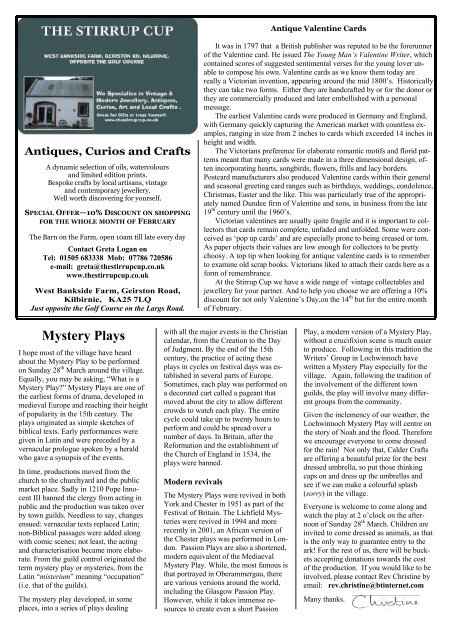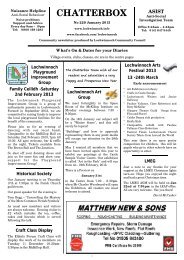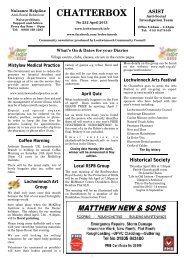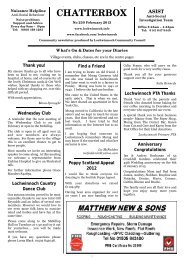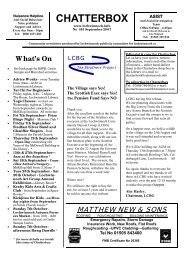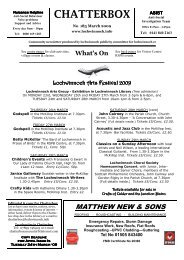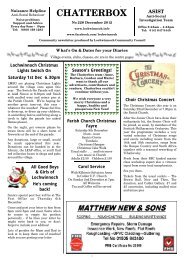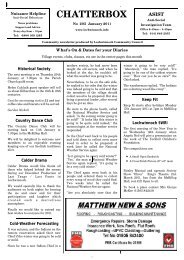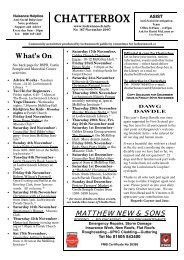CHATTERBOX - Lochwinnoch
CHATTERBOX - Lochwinnoch
CHATTERBOX - Lochwinnoch
Create successful ePaper yourself
Turn your PDF publications into a flip-book with our unique Google optimized e-Paper software.
Antiques, Curios and Crafts<br />
A dynamic selection of oils, watercolours<br />
and limited edition prints.<br />
Bespoke crafts by local artisans, vintage<br />
and contemporary jewellery.<br />
Well worth discovering for yourself.<br />
SPECIAL OFFER—10% DISCOUNT ON SHOPPING<br />
FOR THE WHOLE MONTH OF FEBRUARY<br />
The Barn on the Farm, open 10am till late every day<br />
Contact Greta Logan on<br />
Tel: 01505 683338 Mob: 07786 720586<br />
e-mail: greta@thestirrupcup.co.uk<br />
www.thestirrupcup.co.uk<br />
West Bankside Farm, Geirston Road,<br />
Kilbirnie, KA25 7LQ<br />
Just opposite the Golf Course on the Largs Road.<br />
Mystery Plays<br />
I hope most of the village have heard<br />
about the Mystery Play to be performed<br />
on Sunday 28 th March around the village.<br />
Equally, you may be asking, “What is a<br />
Mystery Play?” Mystery Plays are one of<br />
the earliest forms of drama, developed in<br />
medieval Europe and reaching their height<br />
of popularity in the 15th century. The<br />
plays originated as simple sketches of<br />
biblical texts. Early performances were<br />
given in Latin and were preceded by a<br />
vernacular prologue spoken by a herald<br />
who gave a synopsis of the events.<br />
In time, productions moved from the<br />
church to the churchyard and the public<br />
market place. Sadly in 1210 Pope Innocent<br />
III banned the clergy from acting in<br />
public and the production was taken over<br />
by town guilds. Needless to say, changes<br />
ensued: vernacular texts replaced Latin;<br />
non-Biblical passages were added along<br />
with comic scenes; not least, the acting<br />
and characterisation became more elaborate.<br />
From the guild control originated the<br />
term mystery play or mysteries, from the<br />
Latin “misterium” meaning “occupation”<br />
(i.e. that of the guilds).<br />
The mystery play developed, in some<br />
places, into a series of plays dealing<br />
Antique Valentine Cards<br />
It was in 1797 that a British publisher was reputed to be the forerunner<br />
of the Valentine card. He issued The Young Man’s Valentine Writer, which<br />
contained scores of suggested sentimental verses for the young lover unable<br />
to compose his own. Valentine cards as we know them today are<br />
really a Victorian invention, appearing around the mid 1800’s. Historically<br />
they can take two forms. Either they are handcrafted by or for the donor or<br />
they are commercially produced and later embellished with a personal<br />
message.<br />
The earliest Valentine cards were produced in Germany and England,<br />
with Germany quickly capturing the American market with countless examples,<br />
ranging in size from 2 inches to cards which exceeded 14 inches in<br />
height and width.<br />
The Victorians preference for elaborate romantic motifs and florid patterns<br />
meant that many cards were made in a three dimensional design, often<br />
incorporating hearts, songbirds, flowers, frills and lacy borders.<br />
Postcard manufacturers also produced Valentine cards within their general<br />
and seasonal greeting card ranges such as birthdays, weddings, condolence,<br />
Christmas, Easter and the like. This was particularly true of the appropriately<br />
named Dundee firm of Valentine and sons, in business from the late<br />
19 th century until the 1960’s.<br />
Victorian valentines are usually quite fragile and it is important to collectors<br />
that cards remain complete, unfaded and unfolded. Some were conceived<br />
as ‘pop up cards’ and are especially prone to being creased or torn.<br />
As paper objects their values are low enough for collectors to be pretty<br />
choosy. A top tip when looking for antique valentine cards is to remember<br />
to examine old scrap books. Victorians liked to attach their cards here as a<br />
form of remembrance.<br />
At the Stirrup Cup we have a wide range of vintage collectables and<br />
jewellery for your partner. And to help you choose we are offering a 10%<br />
discount for not only Valentine’s Day,on the 14 th but for the entire month<br />
of February.<br />
with all the major events in the Christian<br />
calendar, from the Creation to the Day<br />
of Judgment. By the end of the 15th<br />
century, the practice of acting these<br />
plays in cycles on festival days was established<br />
in several parts of Europe.<br />
Sometimes, each play was performed on<br />
a decorated cart called a pageant that<br />
moved about the city to allow different<br />
crowds to watch each play. The entire<br />
cycle could take up to twenty hours to<br />
perform and could be spread over a<br />
number of days. In Britain, after the<br />
Reformation and the establishment of<br />
the Church of England in 1534, the<br />
plays were banned.<br />
Modern revivals<br />
The Mystery Plays were revived in both<br />
York and Chester in 1951 as part of the<br />
Festival of Britain. The Lichfield Mysteries<br />
were revived in 1994 and more<br />
recently in 2001, an African version of<br />
the Chester plays was performed in London.<br />
Passion Plays are also a shortened,<br />
modern equivalent of the Mediaeval<br />
Mystery Play. While, the most famous is<br />
that portrayed in Oberammergau, there<br />
are various versions around the world,<br />
including the Glasgow Passion Play.<br />
However, while it takes immense resources<br />
to create even a short Passion<br />
Play, a modern version of a Mystery Play,<br />
without a crucifixion scene is much easier<br />
to produce. Following in this tradition the<br />
Writers’ Group in <strong>Lochwinnoch</strong> have<br />
written a Mystery Play especially for the<br />
village. Again, following the tradition of<br />
the involvement of the different town<br />
guilds, the play will involve many different<br />
groups from the community.<br />
Given the inclemency of our weather, the<br />
<strong>Lochwinnoch</strong> Mystery Play will centre on<br />
the story of Noah and the flood. Therefore<br />
we encourage everyone to come dressed<br />
for the rain! Not only that, Calder Crafts<br />
are offering a beautiful prize for the best<br />
dressed umbrella, so put those thinking<br />
caps on and dress up the umbrellas and<br />
see if we can make a colourful splash<br />
(sorry) in the village.<br />
Everyone is welcome to come along and<br />
watch the play at 2 o’clock on the afternoon<br />
of Sunday 28 th March. Children are<br />
invited to come dressed as animals, as that<br />
is the only way to guarantee entry to the<br />
ark! For the rest of us, there will be buckets<br />
accepting donations towards the cost<br />
of the production. If you would like to be<br />
involved, please contact Rev Christine by<br />
email: rev.christine@btinternet.com<br />
Many thanks.


